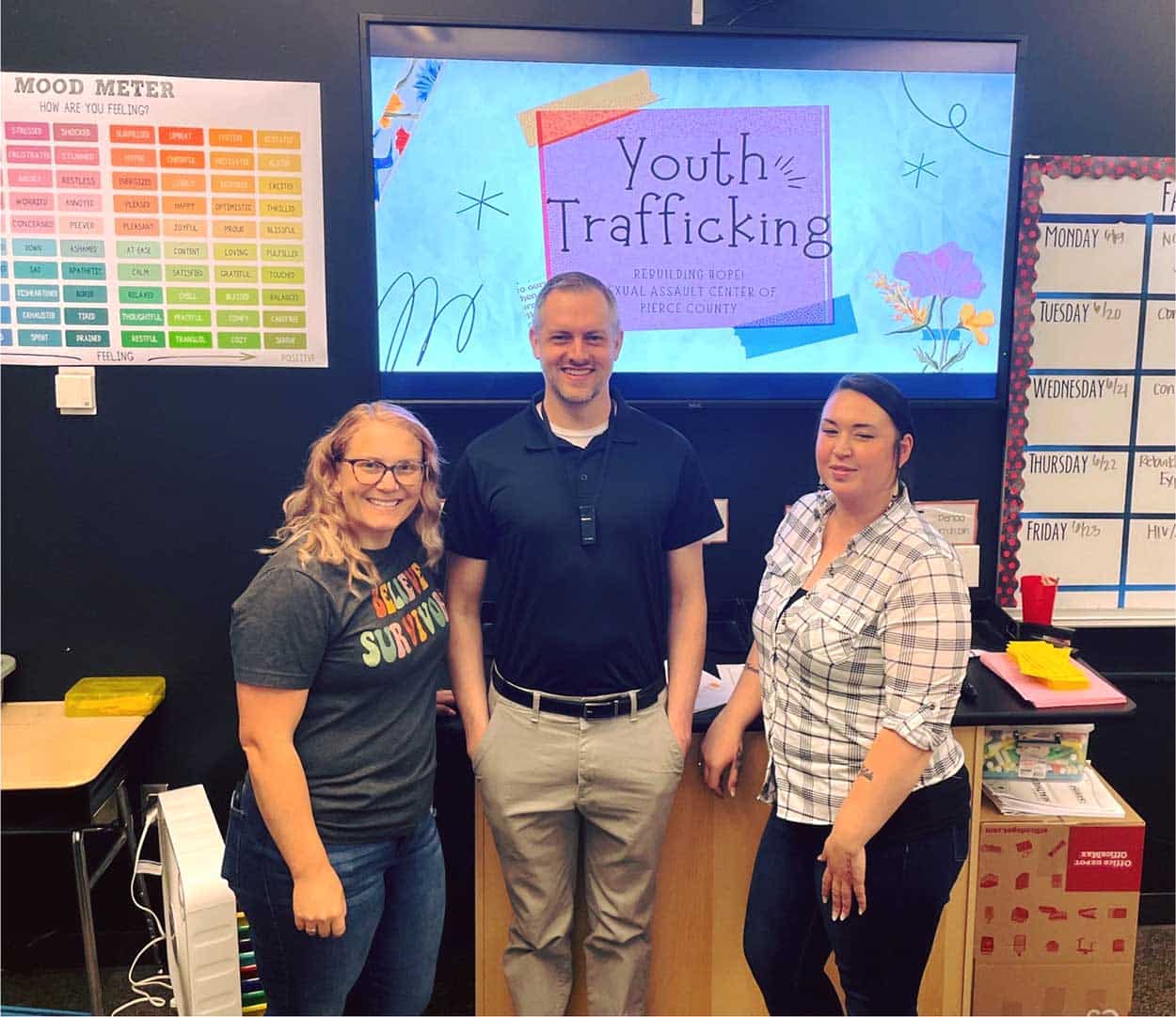Community Health & Wellness Police & Fire
Domestic violence: Resources available for survivors, including help for specific communities
Editor’s Note: This is the third in a four-part series on services for victims of abuse and violence in Pierce County. Other stories include:
Health & Wellness Sponsor
Health and Wellness stories are made possible in part by Virginia Mason Franciscan Health, a proud sponsor of Gig Harbor Now.
- One woman’s story of escaping an abusive relationship
- Inside the Crystal Judson Center, a clearinghouse for helping abuse victims
- How the Gig Harbor Police Department handles these cases, and resources for navigating the legal system
Warning: This story includes some descriptions of violence and abuse.
Intimate partner abuse inflicts many layers of emotional toll. People experiencing it may feel confused, convinced that they can’t leave their abusive partner, or wonder if they can survive outside of the relationship. Many survivors experience depression and post traumatic stress disorder.
No matter where a victim is in the cycle of domestic abuse or violence, resources are available for them.
For victims who aren’t ready to leave their abusers, Pierce County has organizations with confidential systems in place to listen and help. Some of them are culturally specific, such as Our Sisters’ House, which educates, advocates and supports people of color; and the Korean Women’s Association, a multicultural, multilingual organization.
Another is Rebuilding Hope, which helps to guide clients through what to expect when they are ready to report the abuse to law enforcement. All of these resources serve Pierce County residents, and are located in Tacoma, along with other government partners of the Crystal Judson Family Justice Center.
Victims and survivors can access all of the resources available simultaneously, if needed.
Our Sister’s House
Our Sisters’ House trains staff to understand that black and brown residents, especially, can be hesitant to report abuse to law enforcement. The center provides services to victims of domestic violence, youth offenders and their families.
Our Sisters’ House began in 1995 as a group home for young African American girls leaving the juvenile detention center, said Kye Robinson, its deputy director.
Trauma from an abuse incident is hard enough to deal with, and Robinson said having staff from the African American and Hispanic communities can help them face next steps.
“They are not getting the same care, and are put on the back burner,” she said. “It’s important to us. Pierce County has a lot of black residents.”
Two Our Sister’s House staff members also work at the Crystal Judson Family Justice Center, and provide a welcoming face for people of color who make contact with the center.
A community leery of law enforcement
“It goes back to police brutality,” said Beverley Thomas, an advocate at Our Sisters’ House who works with victims of abuse. “Someone who looks like me will not go to the police. A domestic violence advocate inside one of those systems that doesn’t look like me, I don’t know that at the time I was enduring abuse that I would have talked to someone who (was white.)”
For people of color, the familiarity of a person from their community can make the difference in opening up and sharing what they’ve been through, Thomas said. Our Sisters’ House sees an estimated 175 to 200 clients each year from age 17 to 65. Those include people who are experiencing assault, and substance use.
As an advocate, Thomas said the most important thing she does is listen. Though not every advocate has experienced the hardships that they help others navigate, Thomas has a personal understanding of abuse. While reading through information about Our Sisters’ House during her hiring process three years ago, Thomas said that she suddenly admitted to herself that she is a survivor. “It was the first time I had ever said that to myself,” Thomas said.
Training law enforcement to deliver a trauma-based response and partner with local organizations that support victims is key to tackling the needs in Pierce County, Robinson and Thomas said.
“If they could join some coalitions so they can hear what’s going on in those meetings, that would help,” Robinson said. “Sometimes survivors speak at those meetings.”
Rebuilding Hope
Rebuilding Hope is an accredited nonprofit sexual assault center and has been serving Pierce County since the late 1990s. Though it began as a 24-hour crisis response center in 1972, it was only a helpline then. It now provides online chat; crisis intervention; information and referrals for victims of sexual assault and violence and sex trafficking; general medical and legal advocacy; and ongoing emotional support, said Carlyn Sampson, executive director. It serves survivors and supportive loved ones age 13 and older.
“We offer direct-response medical advocacy,” Sampson said. “If someone is admitted to the hospital for sexual assault or abuse, we get contacted by hospital staff and the forensic nurses. They request us to respond out immediately and provide care in the emergency department. The client can accept or refuse our services, but if they consent for an advocate to be there, we can help them understand what to expect from the exam, what their rights are, what else they can choose to do, and if they want to report, we can make that happen right there in the room.”

Left to right: Ashley Blackwell, client services coordinator, Chris Rogers, client services manager and Krystle Haga, prevention advocate providing prevention and advocacy in schools for Rebuilding Hope.
Photo courtesy of Rebuilding Hope
The advocate can be there through the entire process, she said. “We work with them to support them, and take as much of the burden off of them so that they can just work on healing themselves. They don’t have to play a guessing game, or Google their options.”
Unfortunately, Sampson said too often victims and survivors aren’t getting what the law requires.
New legislation
“In 2021, legislation was passed to require medical and legal systems to give more direct referrals, to get on the phone with our hotline so that victims don’t have to keep track of a piece of paper, and that isn’t taking place in Pierce County right now,” she said. “I hope we get there soon, because the response right now is not trauma informed.”
The legislation states in part that “sexual assault survivors receive a referral to an accredited community sexual assault program or, in the case of a minor survivor, receive a connection to services in accordance with the county child sexual abuse investigation protocol, which may include a referral to a children’s advocacy center, when presenting at a medical facility for medical treatment relating to the assault and also when reporting the assault to a law enforcement officer.”
According to Gig Harbor Police Chief Kelly Busey, officers in his department refer minor victims to the Children’s Advocacy Center through Mary Bridge Children’s Hospital in Tacoma, which conducts forensic interviews, has social workers, and medical staff.
Lifelong follow-up
Between July 2022 and June 2023, Rebuilding Hope supported 885 clients through advocacy and therapy, Sampson said. Rebuilding Hope employs 18 full-time staff members and a half dozen volunteers who provide the 24-hour services.
Clients need lifelong followup. They can come and go depending on their needs.
“The door is always open,” she said. “Sometimes 20 years later, they reach out to us, and it holds just as much value to them, and they are in need just as much as the one assaulted two hours ago. This is a trauma-focused sexual assault-and-abuse-specific therapy service for survivors and supportive loved ones ages 13 and over. It doesn’t just affect the survivor. It has a ripple effect.”
Victims often experience stigma and shame associated with sexual assault, she said.
“We have to work against it every day. The biggest issue is not enough funding, and not enough buy-in to equitably provide outreach to the same level that we also need to be providing responsive services, advocacy, and investigation.”
Only about 25 to 30 percent of victims of sexual assault report the crime, and Sampson said that massive dark figure of 75 percent will never engage with law enforcement.
Expansion
Rebuilding Hope takes private insurance, works with a crime victims compensation plan, and operates on a sliding scale for those who don’t have insurance. Sessions start as low as $5 for those who qualify. The institution sees teens at no charge.
A 24-hour helpline called Kitsap Support, Advocacy, and Counseling recently closed in adjacent Kitsap County. The state Department of Commerce’s Office of Crime Victims Advocacy chose Rebuilding Hope to step into the role.
The new responsibility may further stretch already thin resources. The average wait list time for Pierce County victim-survivors seeking sexual assault and abuse-specific therapy services in the Tacoma office is more than four months.
But Rebuilding Hope staff are committed to delivering crisis intervention, information, referrals, and general, medical and legal advocacy through the 24/7 helpline, email, and online chat. Sampson said the hope is to introduce in-person and virtual therapy options over the next year to the Kitsap community.
Prevention
Rebuilding Hope shares its prevention curriculum with Tacoma Public Schools. Through an agreement with Peninsula Communities in Schools, it has worked with students at Evergreen Elementary School on the Key Peninsula through the Boys and Girls Club after-school and summer programs. The curriculum is specifically for K-5 grades.
Scott Hanson, area manager for the Cheney Family Boys and Girls Club and the North Mason Teen Center in Belfair, said both organizations are connected with family support work. When Rebuilding Hope expressed a desire to increase coverage in rural Pierce County, the two teams met to discuss how to implement a program at Evergreen Elementary in Lakebay. It’s a program that draws kids from each elementary school in the Peninsula School District, he said.
“They do different classes, and cover a broad range of things,” he said. “They talk a lot about healthy relationships, and boundaries, and they have internet safety classes, and incorporate them into games and activities and it’s a really cool program.”
Social-emotional learning
Students have had access to the program on a weekly basis for more than a year. It’s something that Hanson said pairs well with the Boys and Girls Club program.
“We have a big focus on social-emotional learning, so their programming reinforces what we’re doing,” he said. “It’s grown into a really cool program. It has been really awesome to reinforce what we use.”
Healthy boundaries, appropriate conversations, how to have a healthy friendship, and how to recognize unhealthy relationships are some of the things the program covers, he said.
“They go over things like questions that a parent or doctor would ask versus some stranger, and who to share what kind of information with, and how to recognize an unhealthy friendship or relationship,” Hanson said. “We see that it has been beneficial especially for the littles, the kindergarten to 2nd grade group, in helping them self-regulate.”
The summer program has been serving around 40 to 50 kids and a similar number during school.
If you or someone you know has been the victim of abuse, Our Sisters’ House can be reached at 253-383-4275 or oursistershouse.com. The Crystal Judson Family Justice Center is at 253-798-4166 or familyjusticecenter.us . If you, or someone you know has been sexually assaulted or is the victim of human trafficking, contact Rebuilding Hope at 253-474-7273, or visit sexualassaultcenter.com.


